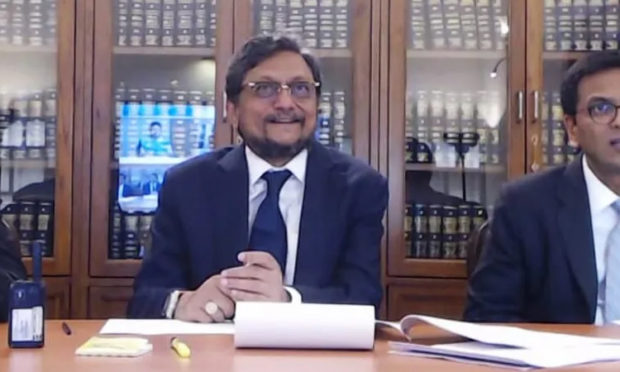
COVID-19: SC issues guidelines for functioning of courts through video conference
Team Udayavani, Apr 6, 2020, 7:18 PM IST

New Delhi: Court hearing in the congregation must become an “exception” during the “extraordinary outbreak” of COVID-19 pandemic and it is necessary that all courts respond to the call of social distancing to ensure they do not contribute to the spread of the virus, the Supreme Court said on Monday.
Passing a slew of directions for all courts across India, it said that the apex court and all the high courts are authorised to adopt measures required to ensure robust functioning of the judicial system through the use of video conferencing.
Observing that “technology is here to stay”, the top court passed the directions by exercising its plenary power under Article 142 of the Constitution and said that all the measures which shall be taken by the courts to reduce physical presence of stakeholders within its premises “shall be deemed to be lawful”.
A bench headed by Chief Justice S A Bobde said, “consistent with the peculiarities of the judicial system in every state and the dynamically developing public health situation”, every high court would be authorised to determine the modalities suitable to the temporary transition to the use of video conferencing technologies.
“All measures that have been and shall be taken by this court and by the high courts, to reduce the need for the physical presence of all stakeholders within court premises and to secure the functioning of courts in consonance with social distancing guidelines and best public health practices shall be deemed to be lawful,” said the bench, also comprising Justices D Y Chandrachud and L Nageswara Rao.
The bench said the outbreak of coronavirus or COVID-19 in several countries including India has necessitated immediate adoption of measures to ensure social distancing to prevent transmission of the virus, and the apex court as well as the high courts have adopted measures to reduce physical presence.
“Access to justice is fundamental to preserve the rule of law in the democracy envisaged by the Constitution of India. The challenges occasioned by the outbreak of COVID-19 have to be addressed while preserving the constitutional commitment to ensuring the delivery of and access to justice to those who seek it,” the bench said, adding, “Court hearings in congregation must necessarily become an exception during this period.”
The top court directed that district courts in each states shall adopt the mode of video-conferencing prescribed by the concerned high court.
“The concerned courts shall maintain a helpline to ensure that any complaint in regard to the quality or audibility of feed shall be communicated during the proceeding or immediately after its conclusion failing which no grievance in regard to it shall be entertained thereafter,” it said.
The bench directed that courts shall duly notify and make available the facilities for video-conferencing for such litigants who do not have the means or access to such facilities.
“If necessary, in appropriate cases courts may appoint an amicus-curiae and make video conferencing facilities available to such an advocate,” it said, adding, “Until appropriate rules are framed by the high courts, video conferencing shall be mainly employed for hearing arguments whether at the trial stage or at the appellate stage.”
The apex court made it clear that in “no case shall evidence be recorded without the mutual consent of both the parties by video-conferencing”.
The bench said if it is necessary to record evidence in a courtroom, the presiding officer shall ensure that appropriate distance is maintained between any two individuals in the court.
It directed that the presiding officer shall have the power to restrict entry of persons into the courtroom or the points from which the arguments are addressed by the advocates.
“No presiding officer shall prevent the entry of a party to the case unless such party is suffering from any infectious illness. However, where the number of litigants are many the presiding officer shall have the power to restrict the numbers. The presiding officer shall in his discretion adjourn the proceedings where it is not possible to restrict the number,” the bench said.
While making it clear that “these directions shall operate until further orders”, the top court said that these directives have been issued in “furtherance of the commitment to the delivery of justice.”
It said that cooperation of all the concerned stakeholders, like judges, lawyers and litigants, is indispensable in successful implementation of these directions to ensure that the judiciary rises to face the unique challenge presented by the outbreak of COVID-19.
The bench has listed the matter for hearing after four weeks.
Udayavani is now on Telegram. Click here to join our channel and stay updated with the latest news.
Top News

Related Articles More

Space for Manmohan Singh’s memorial, Congress playing ‘cheap politics’: Nadda

Middleman held in connection with bribery case involving ED official: CBI

2 detained under PSA, PIT-NDPS Act in J&K’s Samba, Jammu

PM Modi calls Gukesh an embodiment of calmness and humility

Delhi Police announces traffic arrangements for New Year eve celebrations
MUST WATCH
Latest Additions

Udupi: Bruhat Geetotsava concludes at Sri Krishna Matha

Space for Manmohan Singh’s memorial, Congress playing ‘cheap politics’: Nadda

Middleman held in connection with bribery case involving ED official: CBI

2 detained under PSA, PIT-NDPS Act in J&K’s Samba, Jammu

PM Modi calls Gukesh an embodiment of calmness and humility
Thanks for visiting Udayavani
You seem to have an Ad Blocker on.
To continue reading, please turn it off or whitelist Udayavani.

















